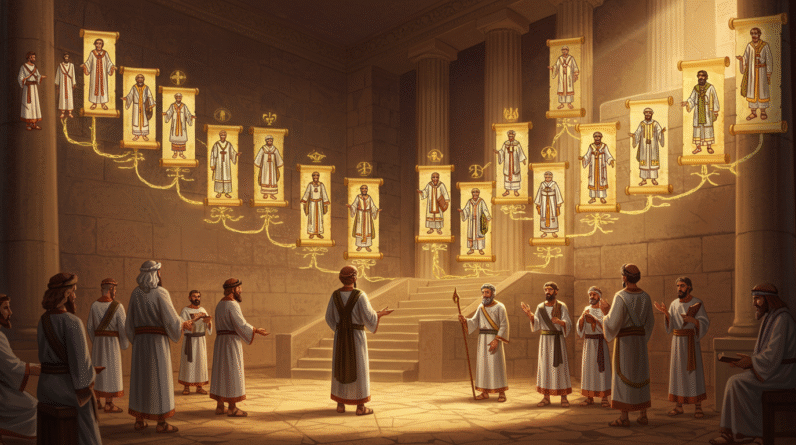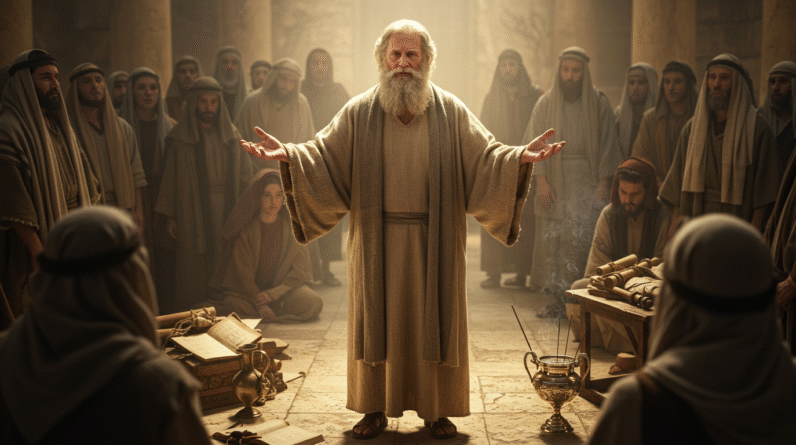Eli’s Warning: The Cost of Neglecting Spiritual Leadership
Hey there! Have you ever thought about what happens when spiritual leadership goes astray? Well, buckle up because we’re diving deep into a story that underscores the significant impact of neglecting spiritual leadership. We’re talking about Eli from the Bible—a priest whose story offers a potent warning for leaders today. With a blend of historical reflection and modern application, let’s explore how Eli’s failures highlight the cost of neglecting spiritual leadership, not just in religious spheres but also in our everyday lives.
The Setting: A Glimpse into Eli’s World
Picture a long, long time ago in the ancient land of Israel. We’re diving into a period in the Bible when Israel was transitioning from the time of the judges to the establishment of the monarchy. It was a time of social and spiritual upheaval. Eli, the high priest at Shiloh, was at the center of it all. He was responsible not only for leading religious services but also for providing guidance to the people of Israel. The weight of spiritual leadership was heavy, and Eli’s failure to properly manage it set into motion a series of events that would ripple throughout the nation.
Eli’s Role: The High Priest at Shiloh
High Priest—it sounds impressive, right? Eli’s job was to mediate between God and the people, serving both in a religious and social capacity. At that time, he was the spiritual leader of the Israelites. His duties included offering sacrifices, teaching the law, and ensuring that the spiritual practices of the nation aligned with divine commandments. This wasn’t a position for the faint-hearted; it required integrity, wisdom, and an unwavering commitment to God’s will.
Eli’s story, detailed in the book of 1 Samuel, unfolds in this complex milieu. As a leader, Eli was expected to uphold the religious tenets and lead by example, showcasing the importance of robust spiritual leadership. Unfortunately, Eli’s story serves as a cautionary tale of what happens when these responsibilities are not fulfilled.
The Downfall: Neglecting Spiritual Leadership
Eli’s most glaring error was his failure to discipline his sons, Hophni and Phinehas, who were priests under his authority. These sons were known for misusing their priestly power, engaging in corruption, and committing grave sins that desecrated the sanctuary at Shiloh. You can imagine the chaos they brought to a place that was supposed to be sacred and serene. Eli, though aware of their actions, failed to intervene effectively. His inaction and lack of leadership reverberated throughout the entire nation, causing a loss of faith and moral decay among the Israelites.
This story is crucial because it illustrates the inevitable cost of neglecting spiritual leadership. Leadership, especially spiritual, is not just about holding a title—it’s about action, accountability, and a willingness to correct wrongdoing. Eli’s neglect set a precedent, sending a message that small acts of negligence can lead to devastating consequences.
Impact on the Nation: A Ripple Effect
Here’s the thing: when the leader falters, the followers lose their way. Eli’s failure had significant ramifications for the spiritual health of Israel. When spiritual leadership is compromised, it often results in a crisis that affects not just individuals but entire communities and cultures. Eli’s story is a vivid reminder that neglecting spiritual leadership can lead to a deterioration of moral values and a breakdown of community ties.
It’s fascinating—and a bit alarming—to see how Eli’s personal failures had national consequences. The loss of spiritual direction made the Israelites vulnerable to external threats and internal discord. You might see this in today’s world, too, where neglecting leadership responsibilities can unravel the moral and ethical fabric of entire societies.

Lessons from Eli: What Leaders Today Can Learn
Eli’s warning is hauntingly relevant to modern leadership challenges. Whether you’re leading a team at work, a group of friends, or a family, the lessons from Eli’s downfall are profound. First, leaders have a responsibility to act decisively, especially when ethical or moral guidelines are breached. Ignoring or softening the consequences for misconduct can encourage others to follow suit. Leaders also need the courage to uphold standards, even when it’s uncomfortable or unpopular.
Eli’s story prompts us to reflect on how the cost of neglecting spiritual leadership can lead to long-lasting consequences. As leaders, you’re tasked not just with making decisions but also with modeling integrity. Regular reflection, seeking accountability from peers, and being proactive rather than reactive are key steps in ensuring your leadership positively influences those around you.
Why This Story Matters Today
You might be wondering, “Why should I care about a story from thousands of years ago?” Well, Eli’s story is timeless. Spiritual leadership isn’t confined to religious contexts; it’s about guiding people towards meaningful and ethical decisions. Today, where ethical breaches in leadership often make headlines, understanding the importance of spiritual leadership is crucial. It encourages leaders to be mindful of their actions and the potential ripple effects on the communities they serve.
When you neglect spiritual leadership, you risk more than just personal reputation. There’s a considerable cost—lost trust, ethical failure, and more. Eli’s warning invites leaders to reconsider how they approach their roles, encouraging a balance between authority and accountability.
Moving Forward: Encouraging Spiritual Leadership
So, how can you apply the story of Eli to modern leadership? Start by fostering open dialogue about ethical standards and accountability in your community or organization. Encourage transparency and hold each other accountable for maintaining ethical practices. Spiritual leadership doesn’t have to be rooted in religion; it can be about upholding values like integrity, responsibility, and compassion.
Reflect on your leadership style, consider the impact you want to have, and take steps to align your actions with those intentions. When you prioritize these virtues, you help create an environment where neglect is replaced by nurturing, and spiritual leadership flourishes rather than fades.
Conclusion: The Lasting Impact of Eli’s Warning
And there you have it. Eli’s story is a poignant reminder of the cost of neglecting spiritual leadership. His failure in leadership wasn’t just a personal misstep; it was a national tragedy. The consequences remind us that leadership, especially spiritual leadership, carries immense responsibility and requires a steady commitment to ethical standards.
As you move forward, consider how you can embody the principles of robust and responsible leadership, whether in your community, workplace, or personal life. Eli’s story is a powerful warning—a call to action for each of us to uphold the virtues that ensure the well-being of those we lead.
Explore More
For further reading and encouragement, check out these posts:
👉 7 Bible Verses About Faith in Hard Times
👉 Job’s Faith: What We Can Learn From His Trials
👉 How To Trust God When Everything Falls Apart
👉 Why God Allows Suffering – A Biblical Perspective
👉 Faith Over Fear: How To Stand Strong In Uncertain Seasons
👉 How To Encourage Someone Struggling With Their Faith
👉 5 Prayers for Strength When You’re Feeling Weak

📘 Jesus and the Woman Caught in Adultery – Grace and Mercy Over Judgement
A powerful retelling of John 8:1-11. This book brings to life the depth of forgiveness, mercy, and God’s unwavering love.
👉 Check it now on Amazon
As a ClickBank Affiliate, I earn from qualifying purchases.
Acknowledgment: All Bible verses referenced in this article were accessed via Bible Gateway (or Bible Hub).
“Want to explore more? Check out our latest post on Why Jesus? and discover the life-changing truth of the Gospel!”








